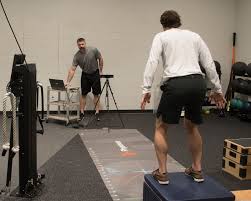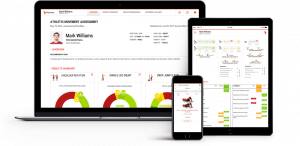Opportunity:
Physimax is an Israeli sports technology company dedicated to helping athletes prevent and recover from movement-based injuries with the goal of minimizing dollars lost to injury and preventing career ending injuries for athletes. Physimax helps competitive sports teams minimize players’ injury risk and maximize athletic performance by providing critical and objective data about an athlete’s musculoskeletal mobility, strength, stability and technique through an automated, real-time, visual-analysis test.
Solution:
The technology combines scientific studies, sports medicine protocols, computer vision algorithms and machine learning abilities to provide clear actionable insights for athletes and teams of all levels with the click of a button. The platform uses computer vision and machine learning technology to analyze athletic movement, identifying nuances in movement patterns. It provides tracking, alerts, and recommendations for individualized training programs to minimize injury risk, maximize performance and help injured athletes recover quickly.
Physimax assessments take only 8 minutes and can be administered by anyone; it doesn’t require expertise or prior knowledge. It is administered with a computer and Xbox kinect camera, making it highly portable. The short assessment time makes it possible to assess hundreds of people in hours. The program includes a wide range of automated functional movement tests, and is suitable for many different types of athletes.
Athlete assessment scores are calculated in relation to same-level norms, maximizing the accuracy level of the results. This allows athletes to change their programming to address deficiencies in their performance and lower the chance of injury.
Effectiveness, Commercial Promise, and Competition:
Effectiveness is hard to measure, as it is impossible to test an individual using the technology against a version of himself who has not used the tech. However, the assessment has successfully pointed out deficiencies in athletes’ movements, and athletes have changed their exercise programming to bring their injury risk scores down to the norm.
- The Indiana Pacers have employed the app and now have the lowest salary dollars lost due to injury [1]
- One notable use case was when Physimax was used to identify factors in a Pacers player’s hip movement that were affecting his knee. After pinpointing the problem, the player received a particular pelvic adjustment that considerably lowered his risk factor of knee injury.
Partnerships with major athletic schools and professional sports teams provide huge potential for commercial growth. Physimax has been validated by several academic institutions including The University of North Carolina, The University of Connecticut and the Military Academy at West Point.
Professional sports teams, however, provide the most lucrative opportunity as they stand to gain the most benefit. For example, NBA teams have lost a collective total exceeding $328 million salary dollars to injury and illness [1] and the MLB lost $1.2 billions on players on the disabled list in 2016 [2].
Sports biometrics is a nascent and highly fragmented space. Physimax faces competition from companies like Kinexon and Kistler, both of which provide real-time data on athletic performance to aid in injury prevention. Kinexon in particular has a competitive advantage, as its wearable sensor allows a continuous collection of data in different scenarios. Presently, Physimax’s assessment is limited to isolated training sessions. l rehabilitation center.
Suggestions / Improvements:
To better position Physimax for commercial success, the company should consider implementing the following:
- Expand the number of potential injury risk factors the app is capable of evaluating, as it gathers more data and use cases over time. This would generate more accurate injury predictions with fewer false negatives.
- Subtract computer and accessory camera to run the application. The product should be moved onto smartphones for easier assessment and more widespread commercial adoption. This would also help individual athletes to monitor their own recovery.
- Increase level of detail for assessments and smart suggestions on exercises to address athlete deficiency. For example, the app could tell the subject which muscle is potentially affected in addition to recommending exercises.
- Add sensor for all game-time and workouts to provide even more information on players
Sources:
[1] http://instreetclothes.com/2018/02/22/nba-injury-report-star-break-2017-18-season/
[2] http://www.businessinsider.com/mlb-injured-players-2017-7
Team Members:
Pavlina Plasilova, Kelly de Klerk, Yuxiao Zhang, Aziz Munir, Megan McDonald
Physimax assessment, with laptop and camera.
Physimax dashboard.



